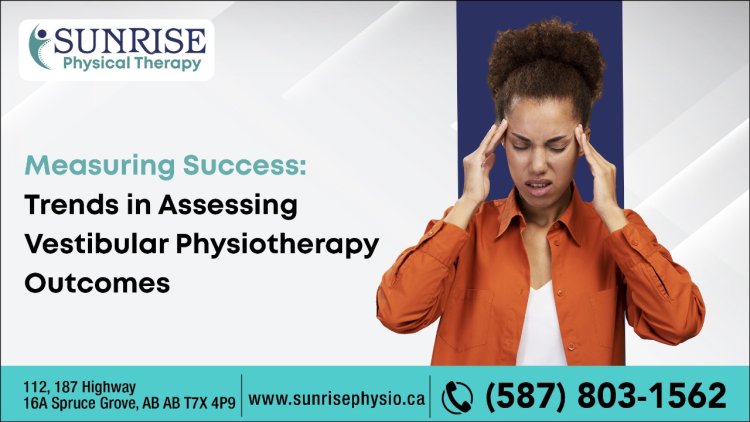Vestibular Physiotherapy Spruce Grove | Sunrise Physical Therapy
Experience specialized vestibular physiotherapy in Spruce Grove at Sunrise Physical Therapy .
Share this Post to earn Money ( Upto ₹100 per 1000 Views )

Vestibular physiotherapy is a specialized area of rehabilitation that focuses on diagnosing and treating disorders of the vestibular system, which contributes to balance, spatial orientation, and eye movement control. At Sunrise Physical Therapy, our dedicated team of vestibular physiotherapy in Spruce Grove is committed to helping individuals overcome dizziness, vertigo, and other vestibular impairments to regain their quality of life. In this article, we explore the role of vestibular physiotherapy in restoring balance and enhancing overall well-being.
Understanding the Vestibular System:
The vestibular system is a complex network of structures located within the inner ear that provides information to the brain about head position, movement, and spatial orientation. When this system becomes impaired due to injury, disease, or other factors, individuals may experience symptoms such as dizziness, vertigo, imbalance, and visual disturbances. Vestibular physiotherapists are trained to assess and treat these symptoms through specialized techniques aimed at restoring normal function of the vestibular system.
Assessment and Diagnosis:
The first step in vestibular physiotherapy is a comprehensive assessment to determine the underlying cause of the individual's symptoms. This may involve a thorough medical history, physical examination, and a series of specialized tests to assess vestibular function, balance, and coordination. Common diagnostic tests used in vestibular assessment include the Dix-Hallpike maneuver, head impulse test, and dynamic visual acuity testing. Based on the results of these assessments, vestibular physiotherapists can develop individualized treatment plans tailored to each patient's specific needs.
Canalith Repositioning Maneuvers:
One of the most common treatments for benign paroxysmal positional vertigo (BPPV), a common vestibular disorder, is canalith repositioning maneuvers. These maneuvers, such as the Epley maneuver or Semont maneuver, involve a series of specific head and body movements designed to reposition displaced otoconia (calcium carbonate crystals) within the inner ear's vestibular system. By restoring the normal alignment of the otoconia, these maneuvers can alleviate symptoms of vertigo and dizziness associated with BPPV.
Balance Retraining Exercises:
For individuals experiencing balance disturbances due to vestibular dysfunction, balance retraining exercises are an essential component of vestibular physiotherapy. These exercises are designed to improve stability, coordination, and proprioception, gradually challenging the individual's balance system to adapt and regain function. Examples of balance retraining exercises may include standing on one leg, walking in tandem, or performing head movements while maintaining balance on a stable surface. Over time, these exercises can help individuals regain their confidence and independence in daily activities.
Gaze Stabilization Techniques:
Visual disturbances, such as nystagmus (involuntary eye movements), are common symptoms of vestibular dysfunction. Gaze stabilization exercises aim to improve the coordination of eye movements and reduce symptoms of visual instability. These exercises typically involve tracking a visual target while moving the head in different directions or performing rapid head movements while maintaining focus on a stationary object. By improving the ability to stabilize the gaze during head movements, individuals can reduce feelings of dizziness and vertigo associated with vestibular disorders.
Education and Lifestyle Modifications:
In addition to specific exercises and maneuvers, vestibular physiotherapists provide education and guidance on lifestyle modifications to help manage symptoms and optimize recovery. This may include recommendations for dietary changes, hydration, stress management techniques, and modifications to daily activities to minimize triggers for dizziness and vertigo. By empowering individuals with knowledge and strategies to manage their symptoms, vestibular physiotherapy promotes long-term symptom relief and improved quality of life.
Conclusion:
Vestibular physiotherapy is a valuable tool for individuals experiencing dizziness, vertigo, and other vestibular symptoms. At Sunrise Physical Therapy in Spruce Grove, our experienced vestibular physiotherapists are dedicated to helping individuals overcome vestibular disorders and regain their balance and confidence. Through comprehensive assessment, targeted interventions, and patient education, we support our clients in achieving optimal vestibular health and enjoying a life free from the limitations of vestibular dysfunction.
#vestibularphysiotherapysprucegrove #balancerestored #vestibularphysiotherapy #vestibularphysiotherapynearme #vestibularphysiotherapy #physiotherapynearme #physiotherapysprucegrove #physicaltherapynearme #physicaltherapy #sunrisephysicaltherapy














